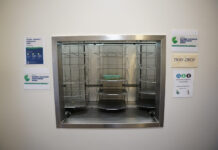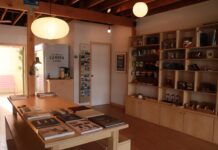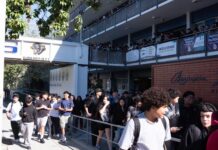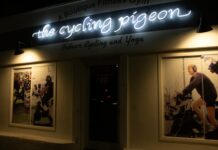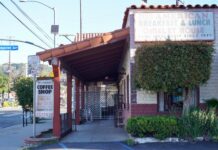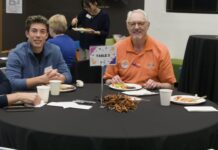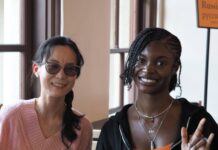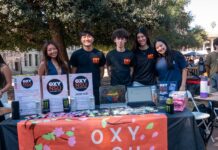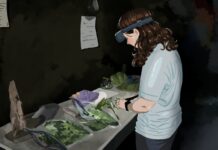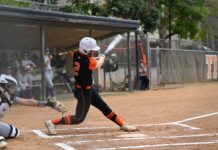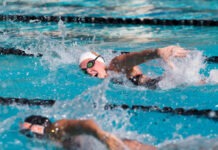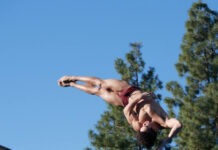Four musicians, their instruments, amplifiers and a veritable jungle of monitoring, lighting and recording equipment are crammed into a repurposed office in the Academic Commons. Two photographers move about the room filming. They dodge equipment and duck wires to find the right angle. Behind the performers, fairy lights blink continuously. The decorations hang from a corner bookshelf, a relic of the room’s former role. Yet the shelf and other left-behind accoutrements still fit into the scene — they bring character to the Critical Making Studio’s (CMS) Tiny Studio Concert Series.
This event on Nov. 15 — the first of three — features the band Pleasure Principle. After a final thumbs-up the livestream starts, and Ella Fornari (senior) introduces the band and plugs the CMS. With a vigorous strum of a ukulele, the show begins.
Inspired by NPR’s popular Tiny Desk Concerts, the Tiny Studio Concert Series befits its name: the room that served as a venue for the Pleasure Principle concert was no more than 40 square feet and packed with a few onlookers in addition to the musicians and production staff. The studio’s sound booth was readied tetris style, with everything just barely fitting in its proper place. Despite the careful setup, some things cannot be rehearsed. With so many wires, amp boxes and bodies, it requires something of a dance to film, change instruments and move about without knocking everything over.
There are hiccups. During Pleasure Principle’s ukelele-driven indie rock show, the livestream cut off when a photographer knocked over the laptop that was recording the performance, but this foible added to the charm of the series. In the second concert on Nov. 23 — which featured Rounak Maiti (senior) and two accompanists — each of the three performers swapped instruments after every song, resulting in an awkward, humorous shuffle as musicians squeezed past each other in the narrow gap between amps.
The concerts are not meant to attract a live audience — there is obviously no room for one. Instead, the shows are meant to be viewed online. Afterward, the studio staff edit the performance using audio from the computer inputs and video from the multi-camera filming crew. The final result is a refined music video.
The performances are hosted by the CMS, located on the ground floor of the Academic Commons and opened this semester as a space for students to work on media and recording projects. It arose as a part of the Center for Digital Liberal Arts last spring but is now a separate, affiliated entity sponsored by faculty member Patty Ahn and supported by the Michael J. Connell Foundation. The workspace is staffed by 15 students with expertise in areas such as video editing, sound recording, physical computing and use of professional software, and the studio is stocked with media making equipment and software. There are cameras small and large, stage lights, a sound booth and a 3-D printer. The Apple computers have licenses for Adobe Creative Suite, which includes programs like Photoshop and InDesign.
Fornari, who is employed by the CMS as a student manager, sees great value in the college’s newest and most technologically advanced workspace for the wider community. Though it only launched this September and has had limited publicity, she is impressed with how CMS’s concert studio has developed.
“We have a collective of students who are constantly in the sound booth,” Fornari said. “We wanted to do something to promote them.”
She hopes the concert and streaming experience will help student musicians by giving them opportunities to produce quality recordings and also publicize the capabilities of the CMS.
“It gives musicians publicity through a feature video which is edited professionally. We’re trying to provide them that reel,” Fornari said.
The student organizers started by featuring artists who are employees or frequent users of the studio and are familiar with the equipment. This was more practical, Fornari said. She hopes to expand the studio’s programming to a wider audience next semester.
Micah Gribbon (junior), who leads Pleasure Principle and works as a digital scholarship assistant in the CMS, was excited by the unique performance opportunity.
“We hadn’t done anything acoustic yet; it was really exciting to challenge ourselves, to strip away from loudness and effects we might use,” Gribbon said.
He is particularly interested in the possibilities of live streaming and the mixed environment which is both a live performance and a studio recording. He was happy to be able to share the experience with his friends and family at home.
The final performance of the semester featured Alex Levers and was held Dec. 1. The live streams were broadcast on YouTube and through the Google+ page.
The CMS is open 24/7. Anyone can stop by and explore the technological tools offered, or check some of them out for a week.
![]()




